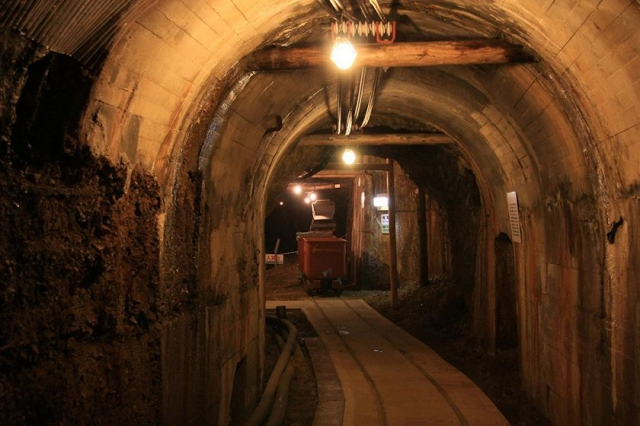 |
One of Sado Island's gold mines (Niigata Prefecture Tourism Association) |
The first official memorial ceremony honoring Korean victims of forced labor at the gold mines on Sado Island during Japan's colonial rule from 1910 to 1945 will be held in Sado on Sunday, attended by South Korean and Japanese government officials and bereaved families of the victims.
South Korea’s Foreign Ministry and Japan’s executive committee for the Sado Mine memorial jointly announced Wednesday that the event, officially titled the "Sado Mine Memorial Ceremony," will take place at 1 p.m. at the Aikawa Kaihatsu Sogo Center in Sado, Niigata prefecture.
Seoul has underscored the significance of the upcoming memorial ceremony, as it will be the first to be attended by Japanese government officials. Past memorial services, held from 2015 to 2022, were organized by a Japanese civic group and later by citizens in October.
The memorial ceremony represents Japan's commitment in return for South Korea's support in July for its bid to inscribe the Sado Island Gold Mines on the UNESCO World Cultural Heritage list, despite the mines' painful history of forcibly mobilizing Korean workers under harsh conditions.
Japan pledged to hold annual memorial ceremonies every July or August, honoring all affected workers, including Koreans, with participation from its local and central government officials.
Japan's executive committee for the memorial service, comprising municipal representatives and local nongovernmental organizations, serves as the event's organizing body.
The memorial service for forced labor workers at the Sado Mine was initially anticipated as early as September, but faced months of delays.
Seoul and Tokyo reportedly struggled to reconcile differences over key aspects of the ceremony. Among them was its title, which has now been finalized as "Sado Mine Memorial Ceremony," without explicitly clarifying the subject of commemoration.
With less than four days remaining, critical details -- such as the identity of the Japanese government’s chief representative, the program schedule and the content of the memorial address to be delivered by the Japanese side -- also remain unsettled. The date and venue are confirmed.
The focus centers on the head of Japan’s government delegation, with South Korea publicly urging the attendance of a high-level official, such as a parliamentary vice-minister and above.
"We consistently requested that this memorial service, being the first of its kind, be conducted with sincerity. To this end, we strongly urged from the very beginning that a high-ranking official from the central government participate," a senior official at the Foreign Ministry said on condition of anonymity during a press briefing.
The Korea Herald has learned that Seoul's Foreign Ministry views the launch of the Ishiba Cabinet on Oct. 1, along with the subsequent cabinet reshuffle, as the main reason for Japan's delay in selecting its chief delegate for the memorial ceremony.
South Korea plans to select its chief delegate of an equal rank after the Japanese government reaches a decision.
"The Korean government intends to determine the level of its representative based on the rank of the official dispatched by Japan's central government," the unnamed official said.
Another key problem has been the lack of sufficient time for the South Korean government to inform bereaved families about the ceremony, due to delays by Japan in finalizing the details.
Consequently, attendance will be limited to 11 members of four bereaved families as of Wednesday morning.
The Ministry of the Interior and Safety, in collaboration with the public-service Foundation for Victims of Forced Mobilization by Imperial Japan, identified and contacted the families of Sado Mine forced labor victims, securing their consent to share contact details with the Foreign Ministry.
The Foreign Ministry reached out individually to confirm attendance, selecting participants on short notice. Only about 20 individuals were reachable.
One surviving victim of forced labor was among those contacted but declined to attend the ceremony due to advanced age, being in their 90s, a second unnamed official said.
The first unnamed official also confirmed that South Korea's Foreign Ministry is "fully covering the expenses for bereaved families" attending the memorial ceremony.
An estimated over 1,500 Koreans were forced to work at the Sado complex of mines under harsh conditions and without proper compensation toward the end of Japanese colonial rule in the 1940s, according to a joint report in 2022 by the Korean Center for Historical Truth and Justice in Seoul and the Network for Research on Forced Labor Mobilization in Kobe.
However, the Japanese government has continued to reject South Korea's request to provide the roster of Korean workers who were forcibly mobilized for labor at the mine during Japan’s colonial rule.
Tokyo also faced criticism for initially framing the history of the Sado Island Gold Mines within the Edo period from 1603 to 1867, deliberately excluding the era of Japan's occupation of the Korean Peninsula, while seeking inclusion on the UNESCO World Heritage list.






![[Herald Interview] How Gopizza got big in India](http://res.heraldm.com/phpwas/restmb_idxmake.php?idx=644&simg=/content/image/2024/11/20/20241120050057_0.jpg)
